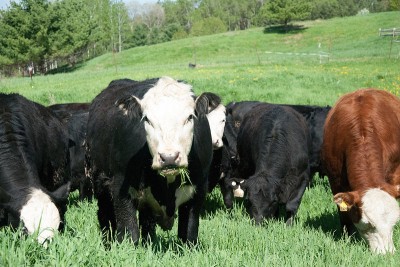|
Listen To The Article
|

Image source: CherryCapitalFoods
Could GMO grass be coming to a backyard and field near you? Yes – and there may be nothing you can do about it.
Both Monsanto and Scotts have started testing the first known variety of genetically engineered grass – grass that would be used both commercially and residentially.
The US government in a little-noticed 2011 move announced it would not regulate GMO grass.
The Scotts Roundup Ready Kentucky Bluegrass GMO grass was designed to withstand “massive amounts” of Roundup herbicide manufactured by biotech giant Monsanto, according to Ecowatch. The grass is not regulated by any government entity and is not required to carry a GMO label and “because of the ease with which grass spreads, could in short order contaminate lawns, parks, golf courses and pastures everywhere,” the website said. There are no laws limiting GMO grass.
“As these seeds spread and more and more grass takes up that genetic trait, we’ll find organic farmers who want to grass feed their beef, can’t do it because their grass is genetically modified, which is prohibited in organic standards. GMOs are pollution with a life of its own,” Bill Duesing of the Northeast Organic Farming Association said in a ctnewsjunkie.com article.
The Centre for Research on Globalization also said the GMO grass could spell the end of grass-fed beef. By definition, organic beef does not come from cows who consume GMO products.
New Survival Seed Bank™ Lets You Plant A Full Acre Crisis Garden!
“While many of us rely on grass-fed beef as a source of healthful, properly raised meat, that option of healthy eating may just move down a peg,” Christina Sarich of the centre wrote. “Why? Not because cattle may have to switch to GM grain, but rather because cattle may be forced to indulge in genetically modified grass.
Unless your neighbor proudly announces that he or she is sowing GMO grass, you will never know your property is in jeopardy. Another concern: The use of Roundup will increase dramatically.
Image source: MamaVation
“Currently, people spot-treat on grass for weeds with Roundup. Can you imagine if GMO grass that’s resistant to glyphosate is sold directly to the consumer and now rather than spot treating for weeds, you can literally just paint the entire lawn?” GMO Free Connecticut founder Tara Cook-Littmans asked.
The GMO grass project began in 2011 when both Monsanto and Scotts were able to convince the United States Department of Agriculture (USDA) to essentially give biotech companies a free pass to market the GMO grass without testing, Ecowatch reported.
“It’s a blatant end-run around regulatory oversight,” Center for Food Safety attorney George Kimbrell said.
Glyphosate is the active ingredient in Roundup. Some environmental researchers have described the product as the “most biologically disruptive chemical” currently being imposed upon the land and the environment, and it may be linked to a host of health disorders, including autism, cancer and Parkinson’s disease, Ecowatch reported. As previously reported by Off The Grid News, a recent study maintains that glyphosate was found in the breast milk of nursing mothers in America.
To sign a petition urging Home Depot and Lowe’s not to carry the GMO grass, click here.
How do you feel about GMO grass? Leave your reply in the section below: